Introduction: Transitioning into Kindergarten
- Transferring children to kindergarten: multiple challenges;
- Necessity to adjust to new environment;
- Possible communication issues;
- Need to accept new roles and responsibilities;
- Necessity to use counseling services;
- Transfer program as a solution.
Although the importance of transitioning into a kindergarten is often overlooked by parents and educators, it, in fact, incorporates a range of challenges for students (Selmi, Gallagher, & Mora-Flores, 2014). The necessity to transfer to a new mode of communicating with peers and performing tasks can be viewed as one of the primary difficulties for learners to handle. Therefore, it is essential to make the process of introducing students to a new academic setting as smooth as possible. With a coherent Transfer Program, an Elementary School Counselor is one of the key people that can assist kindergarten learners in their process of accepting new academic challenges and adapting to a new environment.
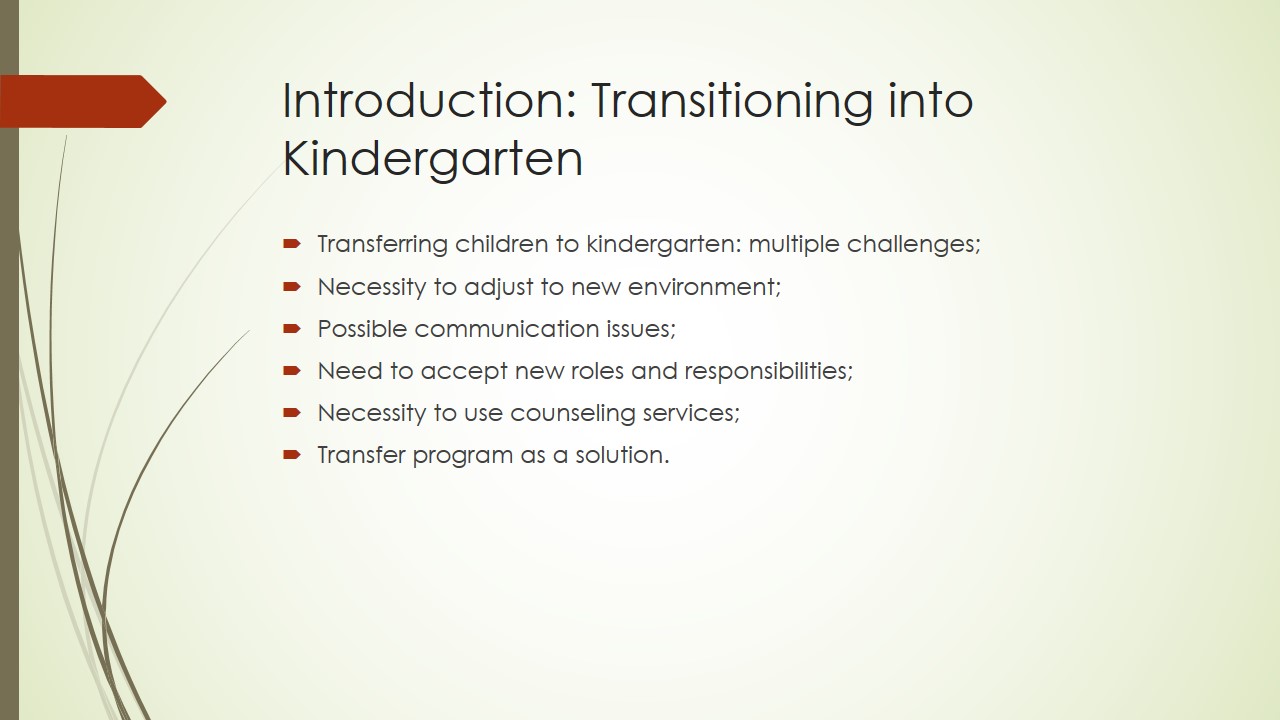
Rationale: Difficulties Faced by Learners
- Problems adapting to a new setting;
- Troubles communicating their needs and ideas;
- Inability to accept new responsibilities;
- Fear of failing to meet set standards.
The importance of a transfer program aimed at reducing students’ exposure to challenges associated with communication and learning. While the significance of the program is often debated, there are impressive pieces of evidence pointing to the necessity to adopt the identified framework for helping students adjust to a new setting (Selmi et al., 2014). The importance of the Transitional Program for kindergarten students is crucial since a range of learners start attending it at a very young age, when they lack social skills (Dunn, 2014). As a result, developing crucial communication skills and the ability to socialize often becomes increasingly hard for learners (Selmi et al., 2014). Herein the significance of the Transitional Program lies. It allows students to develop the ability to communicate their ideas.
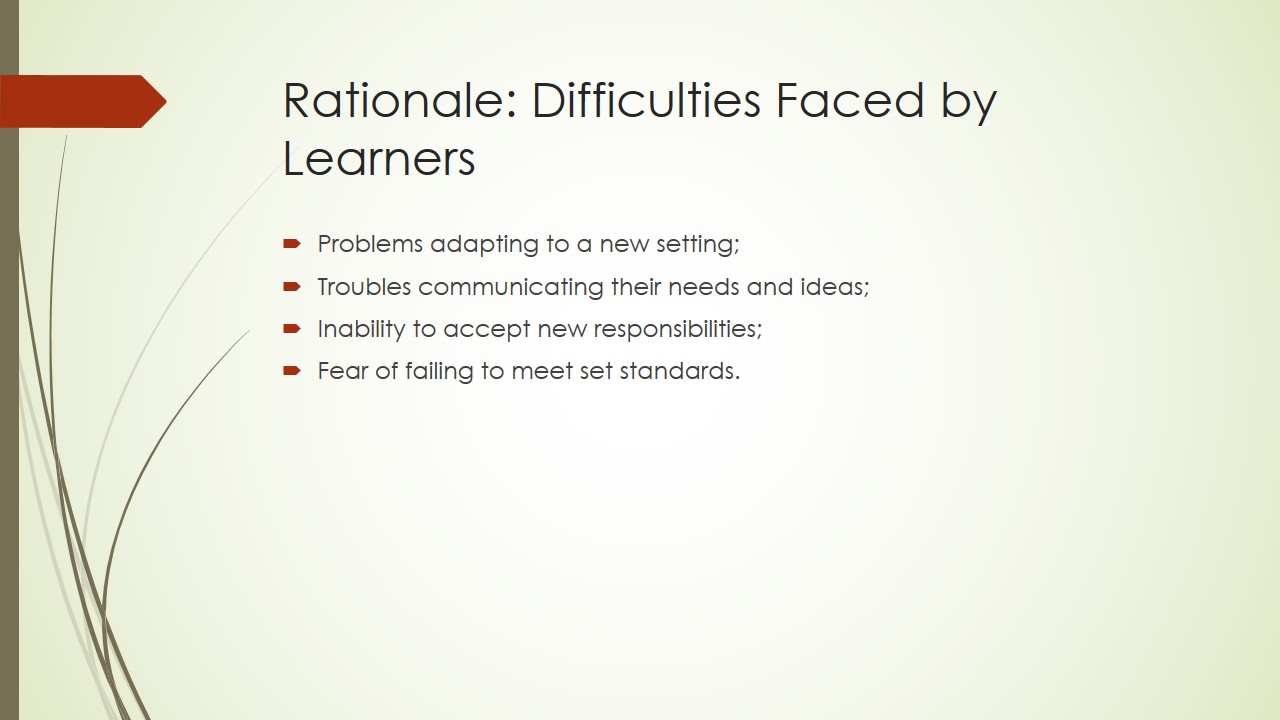
Role as a School Counselor in Transition Program Making
- Mediating the conversation between a student and a teacher;
- Mediating the communication between a teacher and the student’s parents;
- Assisting a student in building a dialogue with peers;
- Shaping the curriculum to relieve the transferring student of the pressure.
As a School Counselor (SC), one should consider assisting transitional students to feel more comfortable in a new environment. For this purpose, an SC must serve as the mediator between a child and a teacher, as well as a child and their peers. Thus, a coherent framework for introducing students to a new environment will be built. Communication with parents should also be deemed as one of the key functions of a SC. Particularly, an SC must outline key curricular options to parents so that they choose an appropriate one for their child. In addition, it is the responsibility of an SC to ensure that the curriculum is shaped to meet the needs of transitioning students. The specified issue is especially important for an SC coordinating the transfer of a learner from the kindergarten to the first grade since the foundation for further learning is built in the process.
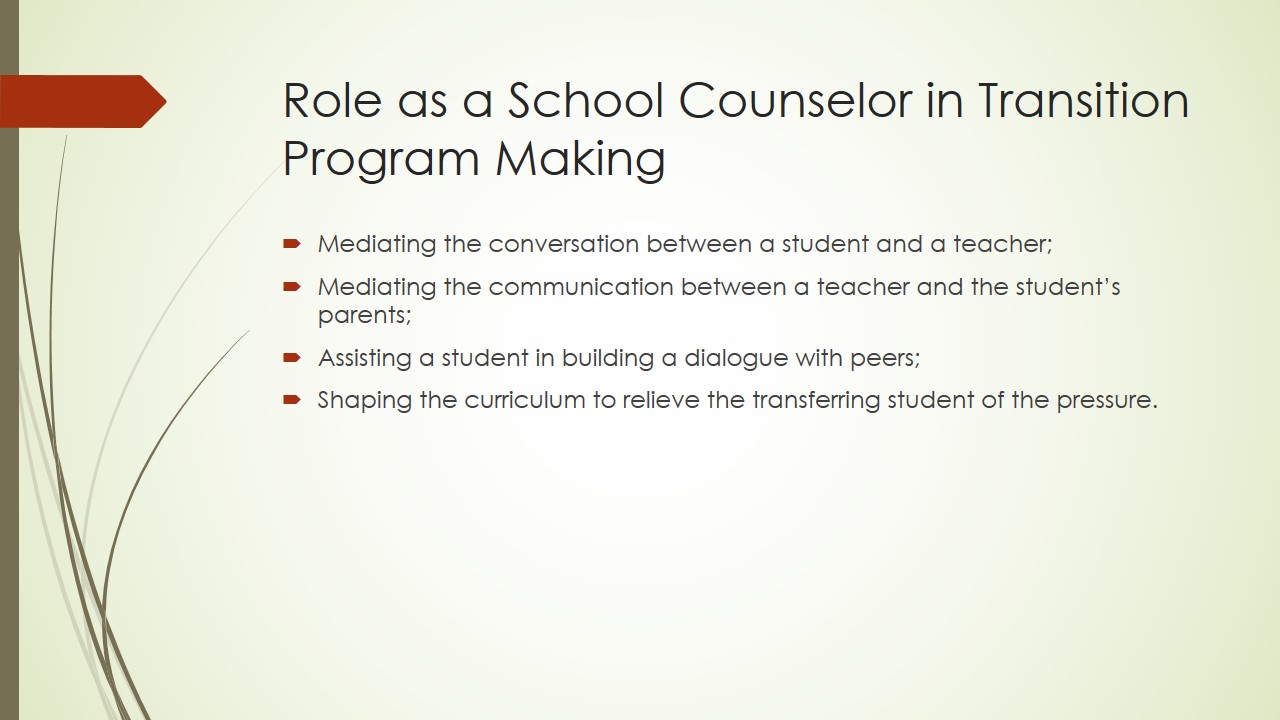
Reason for Designing the Program: Helping Children Gain Experience
- Transferring students to a new environment;
- Students possibly facing alienation;
- Troubles communicating with teachers and peers;
- Need to receive support and assistance;
- Focus on family involvement: instructing parents.
Since essential social and academic skills are developed in children at the specified age, it is imperative to ensure that students are provided with the environment that is most favorable for acquiring crucial knowledge and skills. Consequently, there is a need to design the program that will help reach out to vulnerable learners who need support in being integrated into a new academic environment.
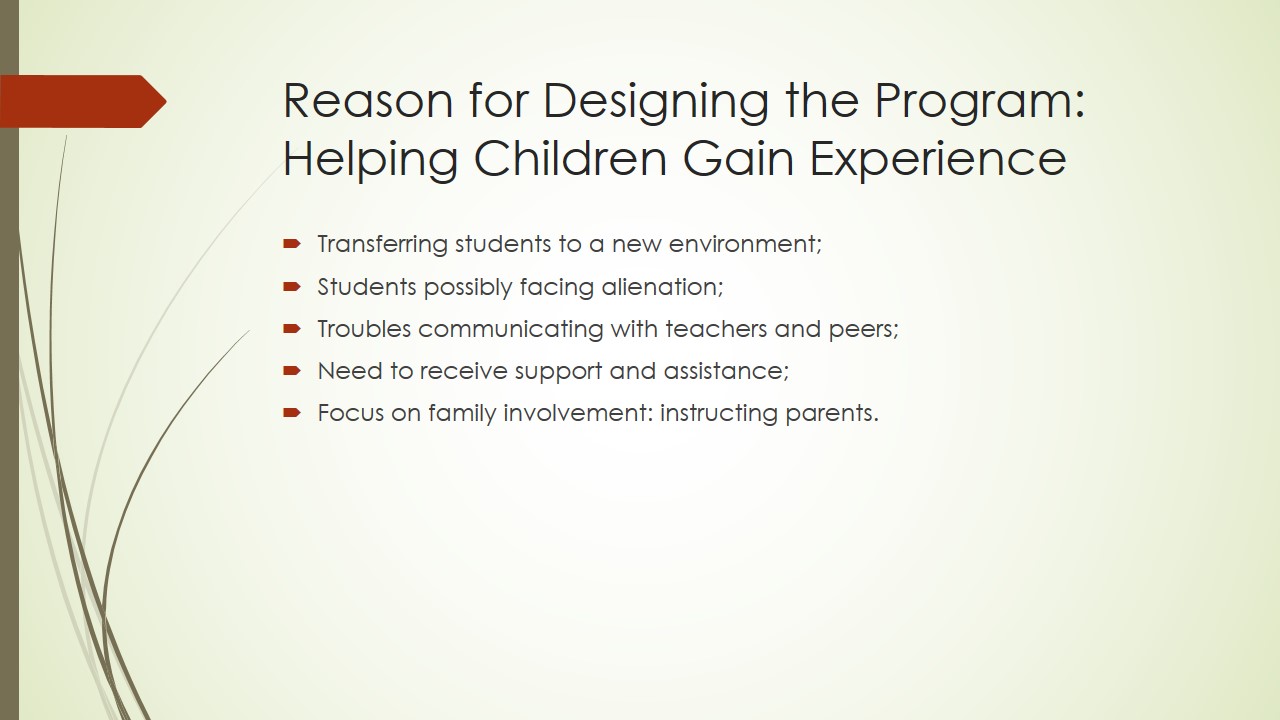
Direct Services: Assistance to Be Offered
- Exploring the learner’s background;
- Establishing contact with the student and their parents;
- Assessing the student’s academic skills;
- Evaluating the learner’s communication skills;
- Introducing cognitive behavioral interventions;
- Providing support and scaffolding the student;
- Re-evaluating the student’s progress.
An SC will need to offer counseling services to both students that transfer from the kindergarten to the first grade and their parents. The latter need extensive instructions concerning the ways in which the process of adjusting to the new academic setting can be turned significantly less difficult for a learner. For instance, an SC will have to include direct services such as the assessment of a student’s academic skills and determining their needs. Extensive counseling services should also be regarded as essential elements of the process of assisting students undergoing transfer from kindergarten to the first grade. The use of direct interventions should also be regarded as a necessity. Finally, re-evaluation will have to be carried out to determine the success of the transfer.
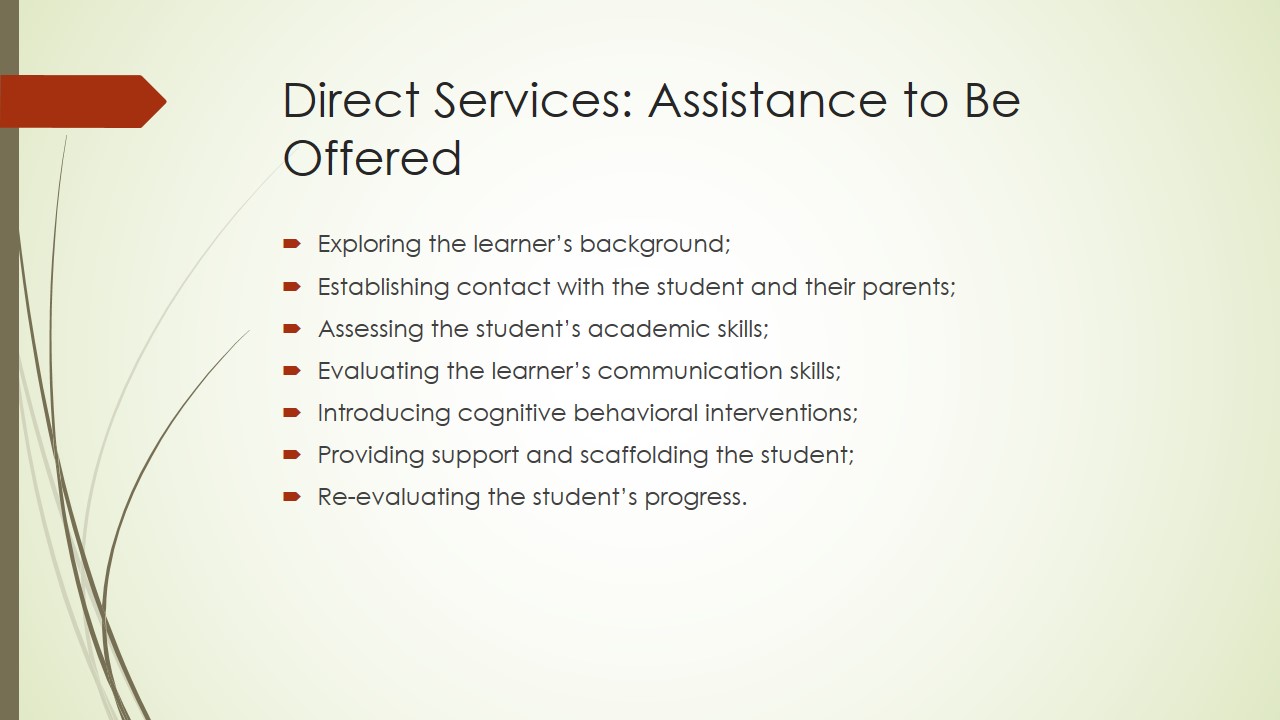
General Group of Students: Description and Interventions
- General type: emotional support (family, peers, teachers);
- Communication skills: focus on becoming social;
- New roles and responsibilities: managing challenges;
- Possible solution: peer-assessment as a teaching tool.
When considering a general type of learners, one must keep in mind that they require mostly emotional support from teachers and parents. In addition, target learners need to develop communication skills efficiently. Thus, they will be able to acquire the communication skills needed for developing the ability to socialize successfully. Furthermore, the target demographic will require help in managing new tasks and responsibilities, including academic ones. Peer assessment can be viewed as one of the solutions allowing them to obtain the necessary social and academic skills.
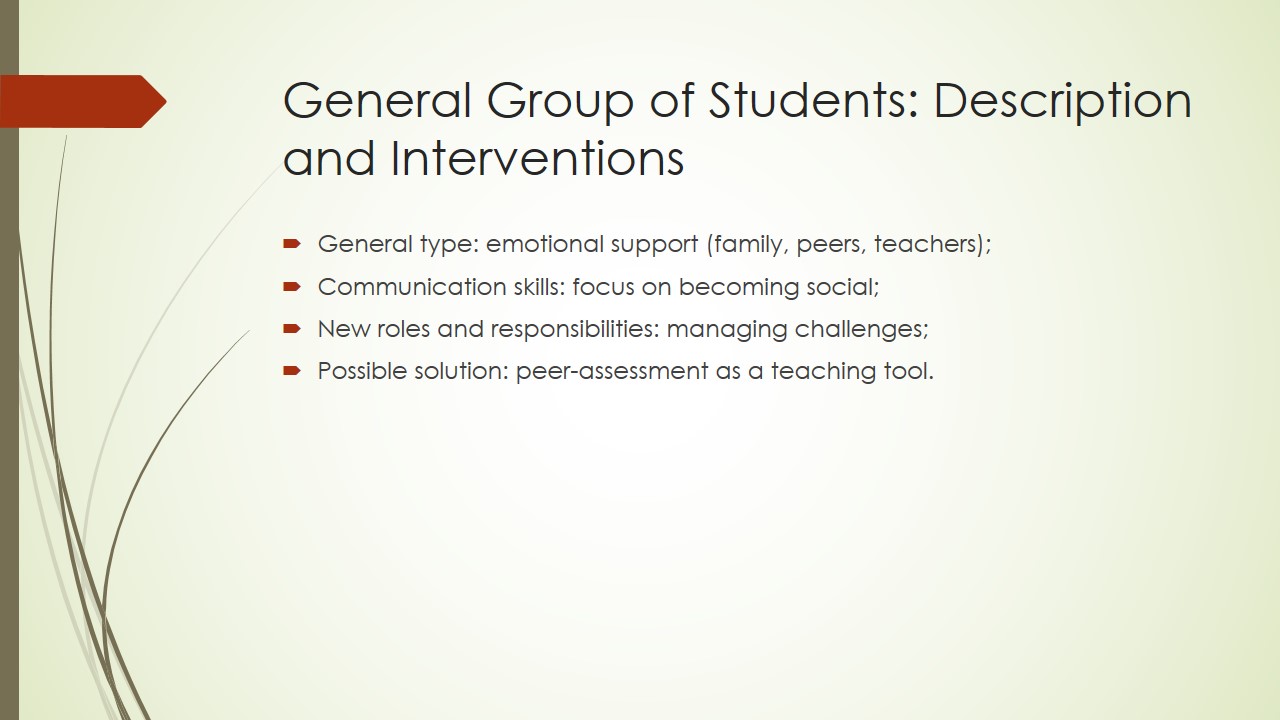
Students Needing Additional Support: Defining Special Needs
- Assessment of the learner’s characteristics;
- Individualized learning plan;
- Indicators: developmental issues;
- Indicators: psychological concerns;
- Indicators: physiological deficiencies;
- Indicators: problems communicating with peers and adults;
- Indicators: lack of understanding of school rules and standards;
- Indicators: absence or underdevelopment of essential academic/social skills;
- Indicators: cultural/ethnic background different from the rest of the community.
Students requiring special assistance, however, will demand greater attention from teachers and parents. Learners with psychological or physical deficiencies, including developmental issues, as well as learners from a different cultural or ethnic background than the rest of the community, can be viewed as the target demographic. The identified type of learners will require an elaborate scaffolding program and extensive counseling services to prevent the instances of conflicts, delays in the learners’ development, etc. (Dunn, 2014).Therefore, an individualized transition plan based on the learner’s assessment is due. The support of the community is not to be underrated; particularly, the use of community resource mapping must be deemed essential.
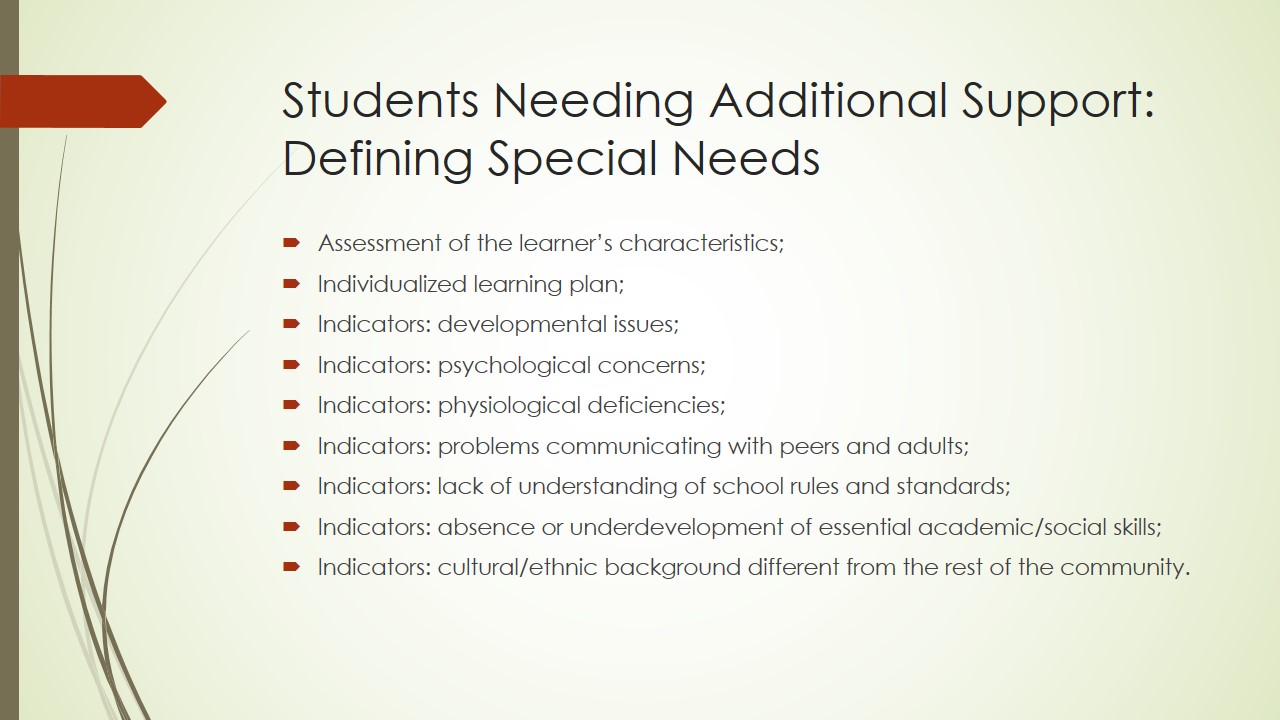
Indirect Services: Other Stakeholders
- Focus on encouraging parents to participate and support their children (PTAs and other similar organizations);
- Placing emphasis on cooperation between schools and school boards (school boards and school districts);
- Provision of opportunities for professional development of SCs (state competency programs).
Apart from providing direct services, an SC may also offer indirect ones by referring students and their parents to other agencies. For instance, it will be crucial to cooperate with the school board to design the program that will provide a uniform approach toward meeting the needs of vulnerable students. In addition, it is necessary to ensure that opportunities for professional development are provided to SCs. Thus, transferring students will be able to receive the assistance that they need in order to be integrated successfully into the target academic environment.
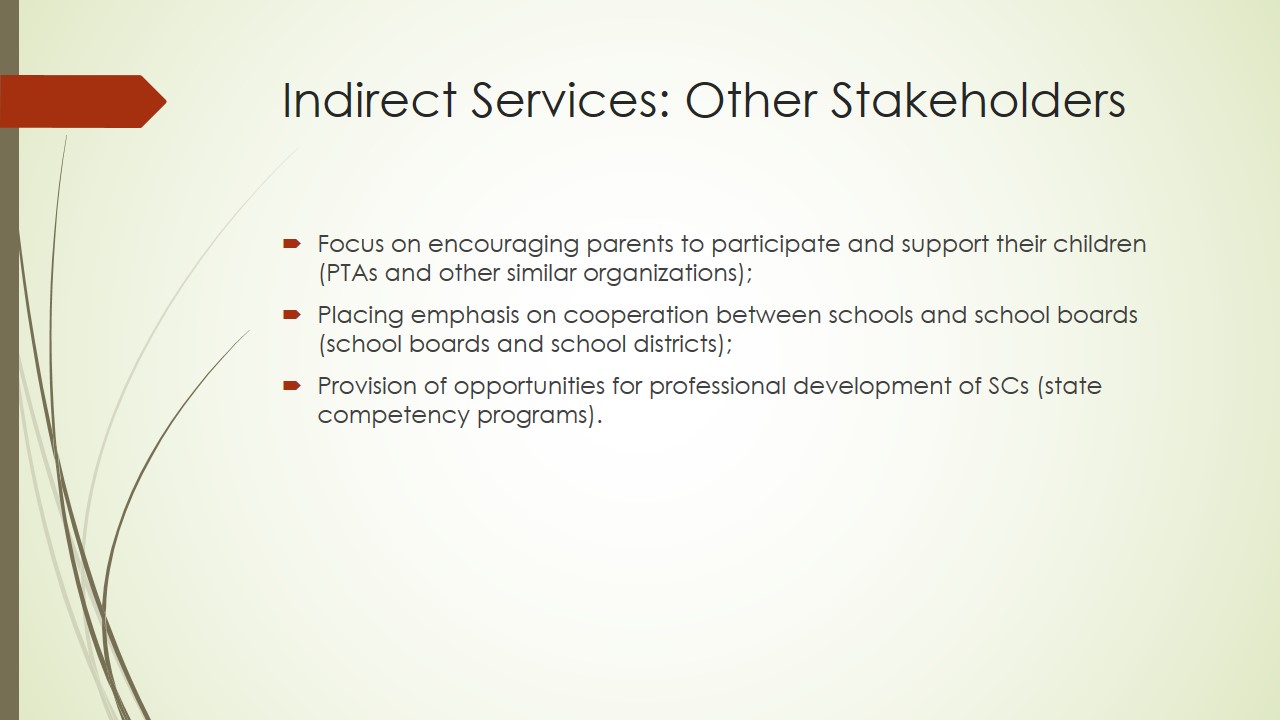
Parents: Developing a Connection and Providing Instructions
- Offering SCs extensive information about learners and their needs;
- Receiving instructions about the application of strategies for supporting learners;
- Encouraging students to develop and use appropriate social skills;
- Offering feedback to teachers for the further design of improved interventions;
- Creating the environment for students’ personal and academic growth;
- Providing students with extensive emotional support.
The role of parents in enhancing the process of transitioning from a kindergarten to the first grade is not to be underestimated, either. Teachers must build a dialogue with parents to provide them with detailed information about meeting their children’s academic needs and encouraging them to excel in learning. Efficient communication tools, including social networks, must be utilized for this purpose. Furthermore, parents will assist SCs in building a dialogue with specified students. As a result of the interventions customized to address specific issues faced by students, the latter will be capable of developing an emotional and social connection with their new environment. Consequently, the foundation for their further successful integration into the school community will be possible. In addition, parents will receive instructions from SCs concerning the strategies that can be used in the home setting to ensure target students’ progress.
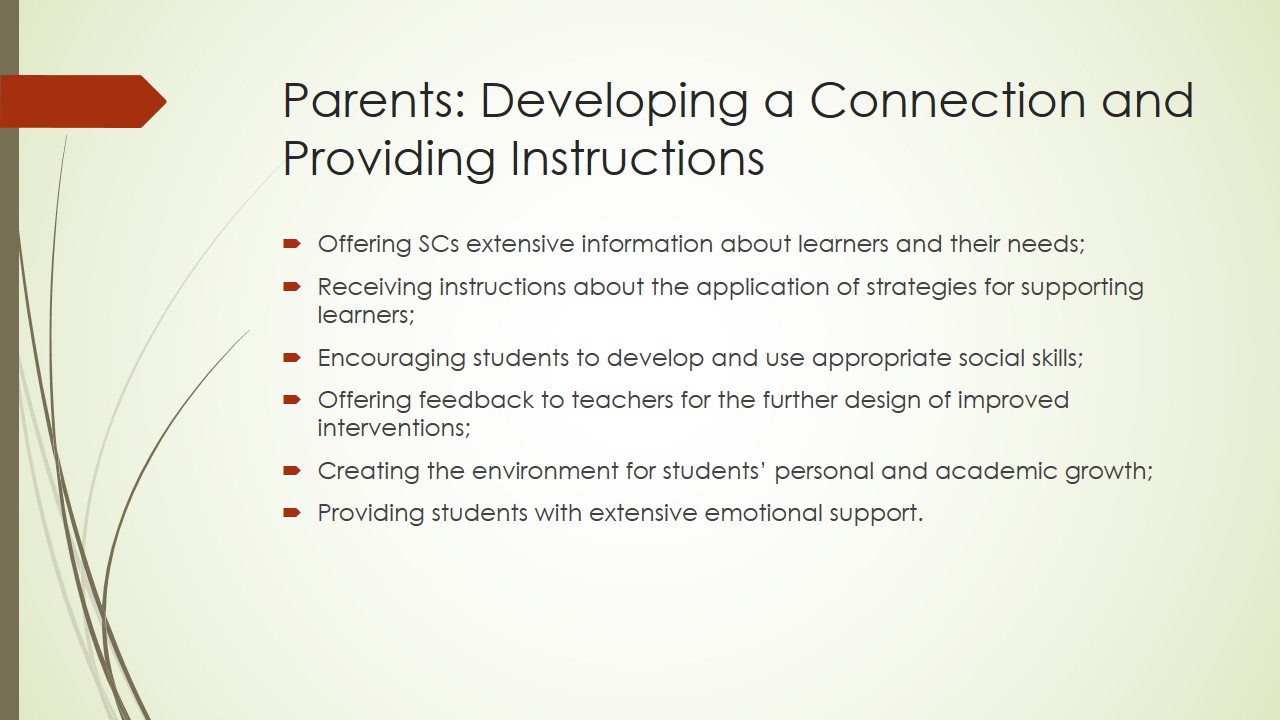
Staff: Educating Teachers about Students’ Needs
- Creating a coherent program for building awareness among teachers;
- Prompting a multicultural approach toward meeting learners’ needs;
- Promoting the concept of continuous professional development;
- Placing emphasis on the possibility of cross-cultural conflicts.
Apart from giving parents an opportunity to learn about supporting their children (transferring students), an SC will also have to consider instructing teachers so that they could offer students the best possible services. Particularly, it will be necessary to ensure the provision of lectures and education materials that will help teachers develop a cohesive and unique approach to meeting the needs of any student within the context of the transfer program. The course will have to embrace a vast range of issues from creating the environment in which students from different cultural backgrounds feel comfortable to ensuring the safety of students with special needs when integrating them into the environment of a new classroom. Therefore, it will be crucial to focus on not only health-related aspects of the issue but also on possible multicultural issues faced by teachers and learners.
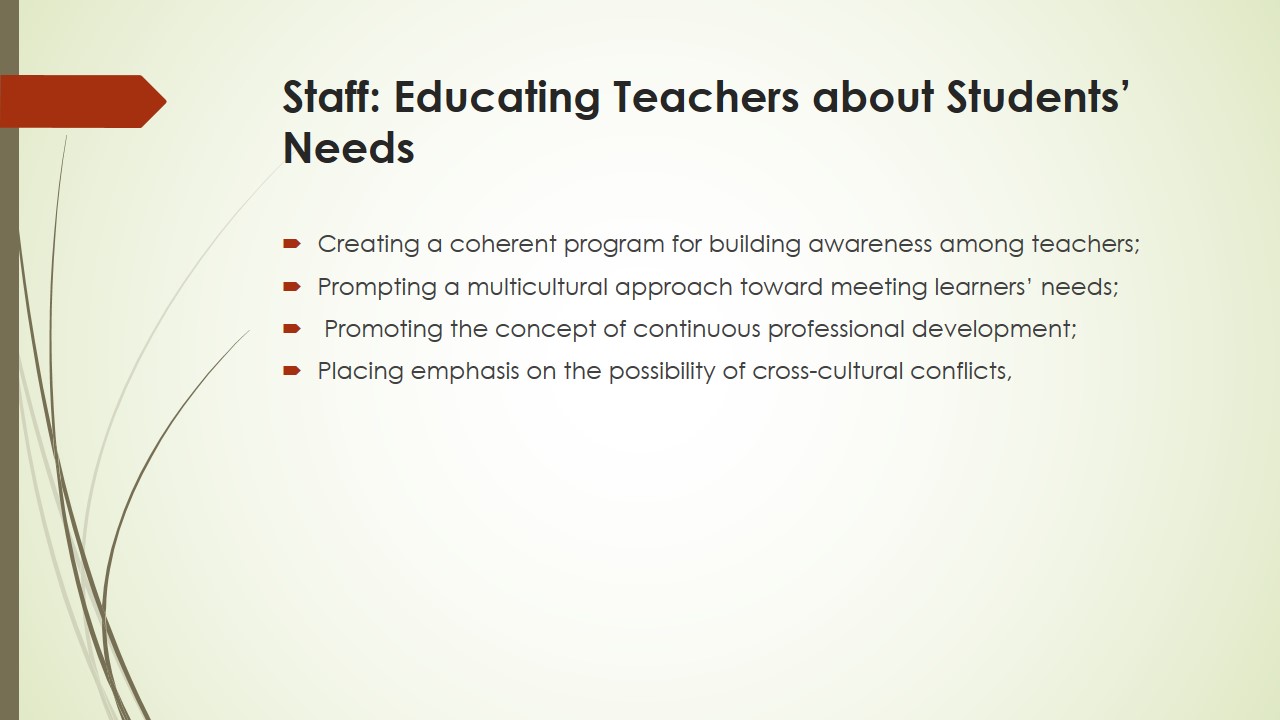
Referrals to Other Providers at School: Additional Help
The use of a referral should be considered crucial in case learners need the support of other experts (e.g., a school psychologist).
Students may also need the assistance of other experts at school. Therefore, in case the intervention does not work, referrals to the school psychologist will be required.
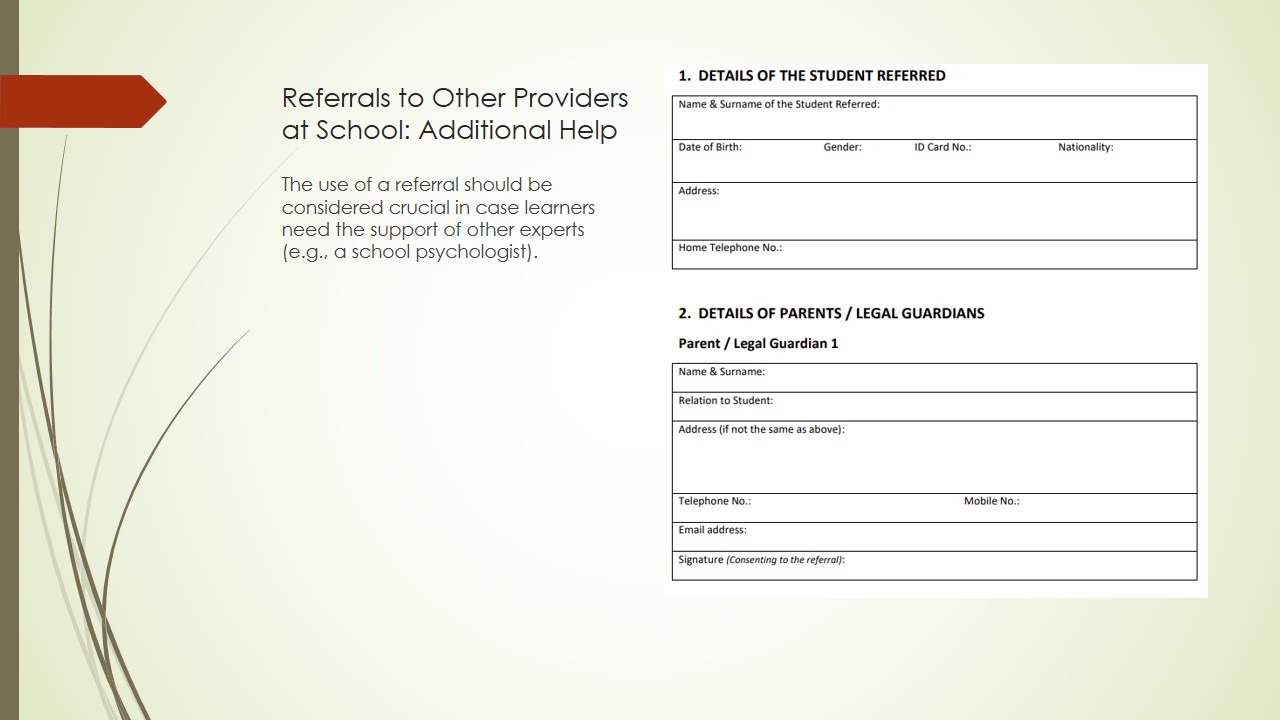
Evaluation: Determining the Efficacy of the Transition Program
- Assessment of students’ progress is essential;
- Academic progress must be evaluated;
- Emotional development will need to be assessed;
- Social and Emotional Learning (SEL) test will have to be used.
To ensure that the transition program works efficiently, one will have to provide an adequate assessment of the progress made by learners. For this reason, the tools for evaluating learners’ progress will have to be provided. The use of an assessment that helps determine the presence of basic literacy skills in elementary school learners will have to be used (Sadeghi, 2014). Furthermore, one will have to adopt the framework for assessing the emotional state of students (e.g., the SEL test (“Social and Emotional Learning (SEL) and Student Benefits,” n.d.)).
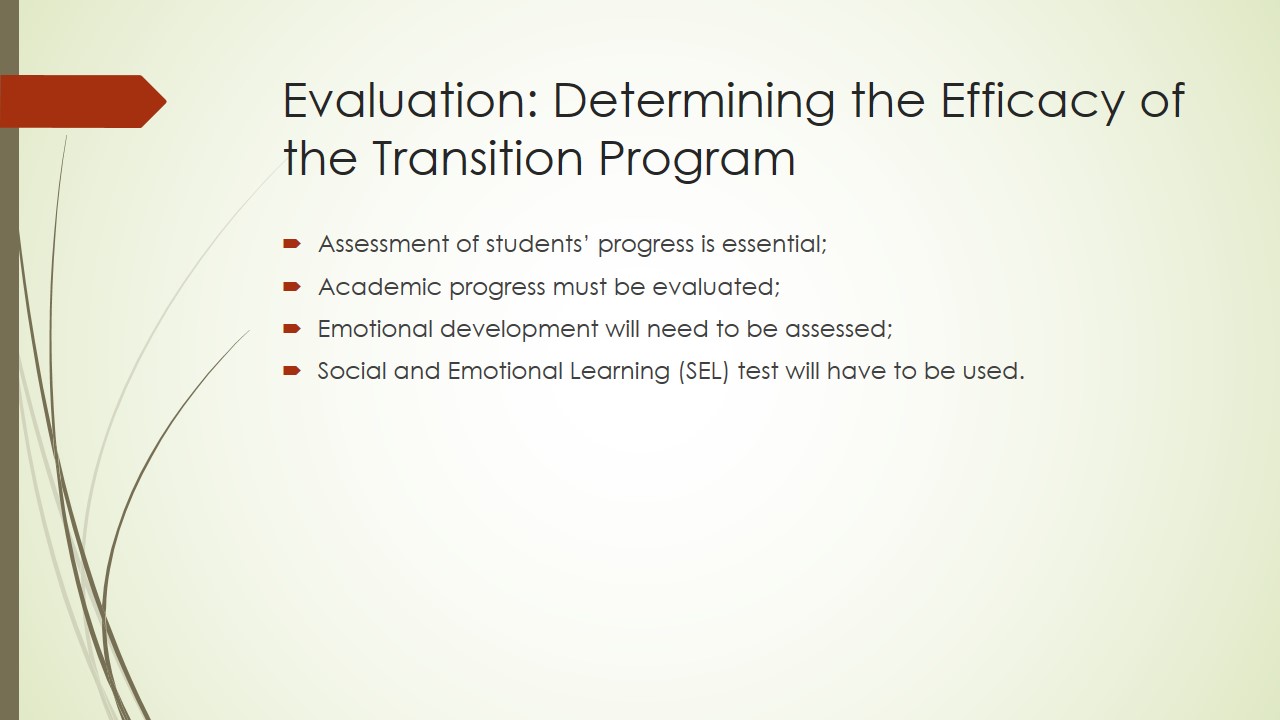
References
Dunn, O. (2014). Collins introducing English to young children: Reading and writing (Collins teaching essentials). London, UK: Harper-Collins.
Sadeghi, S. (2014). The role of corrective feedback in writing improvement. A case of Iranian EFL learners. New York, NY: GRIN Verlag.
Selmi, A. M., Gallagher, R. J., & Mora-Flores, E. R. (2014). Early childhood curriculum for all learners: Integrating play and literacy activities. Thousand Oaks, CA: SAGE Publications.
Social and Emotional Learning (SEL) and Student Benefits. (n.d.). Web.